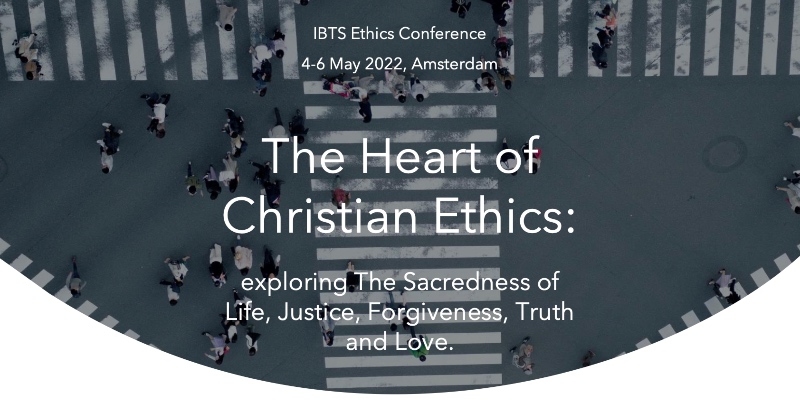Finding unity in the heart of Christian ethics
The International Baptist Theological Study Centre (IBTS) is hosting a conference in Amsterdam from 4-6 May on the theme “The Heart of Christian Ethics.” Theologian-in-residence David Gushee explains more

I applaud leaders at IBTSC, notably Mike Pears, Ingeborg Te Loo, and David McMillan, for their innovative design of the conference. The conference will bring fairly brief presentations reflecting on lived experience together with somewhat longer academic presentations – then the group will collectively do some theological and ethical reflection on the entire conversation using the World Café discussion approach. This makes the conference accessible to both laypeople and scholars and brings Christian people together in important conversation.
The conference is based on themes developed in my new book: Introducing Christian Ethics: Core Convictions for Christians Today (Front Edge, 2022). This book, a comprehensive, accessible new introduction to Christian ethics, contains a mid-section identifying five core norms: the sacredness of life, love, justice, forgiveness, and truth. My claim is that these five core norms are central to the entire Christian moral life and applicable when considering any particular issue. Each of these norms receives its own chapter in the new book.
IBTS Centre leaders concluded that it would be exciting to build a conference around these five norms, under the heading “The Heart of Christian Ethics.” That’s not a bad tagline to describe what these norms are. They are indeed the beating heart of Christian ethics in many ways: every life is sacred and must be treated with proper dignity and respect. Love your neighbour as yourself. Do justice. Tell the truth and live truthfully. Forgive as we have been forgiven. Live accordingly.
Of course, this does not resolve every – or any – specific, concrete, moral dilemma that arises in personal or social life: how much money do I need to live? When (if ever) is abortion permissible? When (if ever) is war justifiable? What does ecological responsibility require of my family? What health care choices are appropriate at the end of this particular human life? How shall power relations between owners and workers, women and men, and competing nations, be arranged? What sexual relationships can receive God’s blessing? How do we overcome systemic racism in society?
Many times Christians, at least in the Protestant traditions, leap rather briskly from biblical texts deemed relevant to very specific judgments about right and wrong in particular cases. In doing so we leap right over not only 2000 years of historic Christian argument about issues but also central moral norms that ought to be considered in relation to every issue. This leap can leave us heading right over a number of moral cliffs, or at least making some most unfortunate moral judgments.
But if we learn to consider all moral issues from within “the heart of Christian ethics,” our moral reflection and action can be better disciplined. We can “look before we leap” as we filter our reflection, and our emotions, through the central moral norms of our faith tradition. This does not mean moral decision making will be easy; indeed, it might seem harder, because there are more factors to consider. But it should also result in more thoughtful and balanced processing of moral dilemmas, while also calling all Christians to the character qualities that we should be seeking to develop in ourselves and carry forward into all aspects of our lives.
One other thought: many Christians, including Baptists, are divided on a number of concrete moral issues. When it comes to getting into the details of issues like war, criminal justice, assisted suicide, abortion, gender roles, marriage and divorce, creation care, and so on, we often sink into disagreement and, sadly, sometimes bitter conflicts. This can lead us into settled patterns of not talking to each other, indeed, of bitter division.
Perhaps focusing on the heart of Christian ethics can, at the very least, remind us of what we have in common as Christians. Thinking systematically about sacredness, love, justice, truth, and forgiveness has the potential to bring us together as fellow Christians. We may still find that we disagree about specific details, or we might find that we think these central norms require different things of us.
But if we discipline our moral conversations within the terms of these heartbeat norms, perhaps we can find more common ground – and mutual respect. And that is always a very good thing.
Please consider registering for the IBTSC “Heart of Christian Ethics” conference. It could be a sweet reunion in lovely Amsterdam.
David P. Gushee is Distinguished University Professor of Christian Ethics at Mercer University, Chair in Christian Social Ethics at Vrije Universiteit, and Senior Research Fellow, IBTSC
The IBTSC “The Heart of Christian Ethics” conference takes place in Amsterdam from 4-6 May, with online participation available too.
Do you have a view? Share your thoughts via our letters' page.
Baptist Times, 10/03/2022